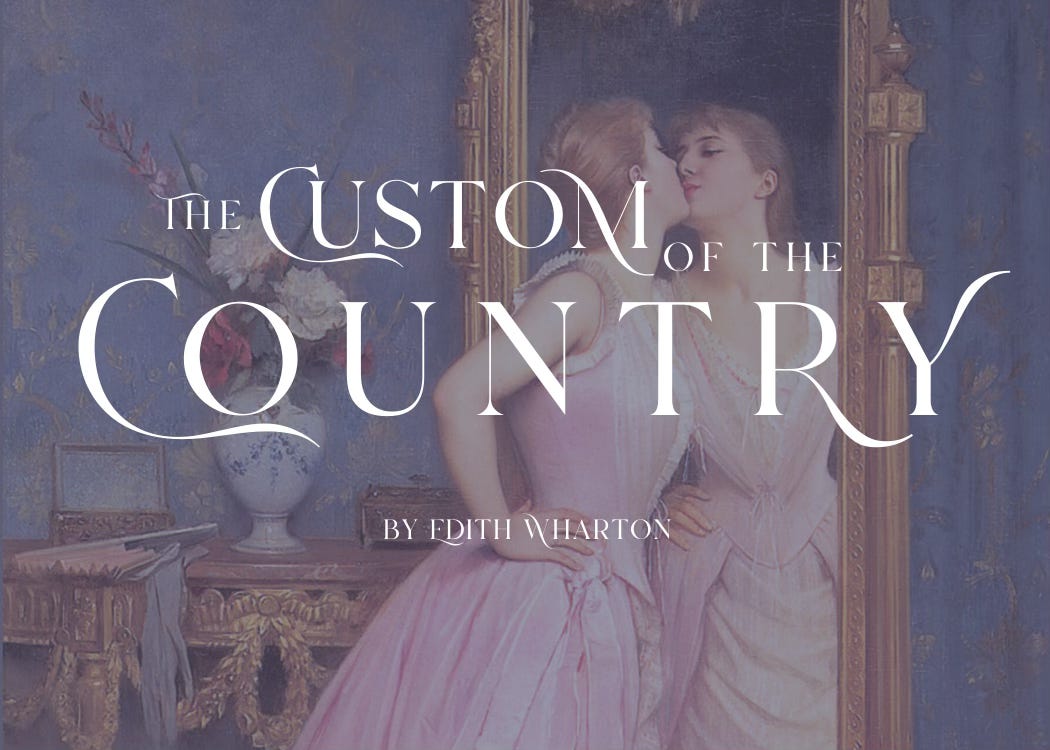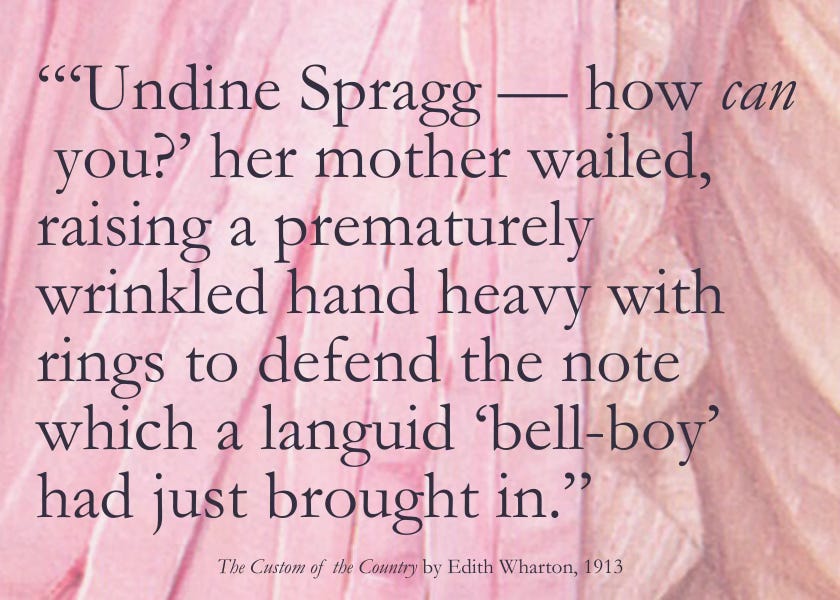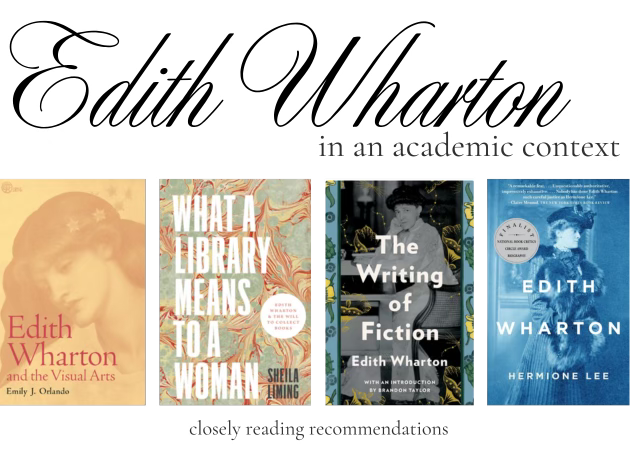"Undine Spragg — how can you?"
Welcome to Week 1 of The Custom of the Country!
Welcome to the Closely Reading book club: a space where we closely read classic literature together and discuss assigned chapters each week. We’re currently reading Edith Wharton’s The Custom of the Country—you’re welcome to join us any time. Here is the introductory post, if you’re just tuning in.
Welcome to week 1
In these read-a-long experiences, we love to start things slow with just a single chapter during the first week. This week, that’s all you need to do:
Read Book 1, Chapter 1 of Edith Wharton’s The Custom of the Country.
In today’s post, I offer my own close reading of the first sentence, and give you some ideas for how to dive into a slow reading. I’ll also share my setup with you and give you a list of three questions to ponder as we kick-off this read-a-long.
Let’s dive in!
The first lines
If you’ve been here before, you know we love a first line.
In fact, the first lines of novels like The Custom of the Country often function as a kind of microcosm for the novel as a whole. That is, the first line tells us a lot about what to expect from the rest of the story.
Here’s the first sentence of The Custom of the Country
Before I tell you what I think of it, I want you to step back and process the line for yourself. Try as hard as you can to not read the rest of the page — just focus on this first sentence for now.
Ask yourself:
What do I notice about the sentence?
Has the sentence told me anything about place, time, character or setting?
How is the sentence constructed? Think: tone, voice, style, grammar.
How I read it
I love a book that opens with dialogue.
Here, Undine is being chided by her mother.
The first two words of the novel are “Undine Spragg,” and so I have started already — from just two words — to imbue this person with some importance.
When I continue reading the sentence, I learn more:
Undine’s mother is presumably upset by some action Undine has taken.
“Wailed” is quite a strong word choice. It reminds me a bit of the neurotic mother from Pride & Prejudice, Mrs. Bennet, who was always wailing and whining at her daughters’ decisions.
Undine’s mother is “prematurely wrinkled,” which may be in part due to the “heavy rings” with which she is adorned.
Undine’s mother is on the defense — there must be something important in that “note” she is defending.
And there’s a bell-boy: they’re in a hotel. Interesting.
Can you believe how much we learned in just three lines of text? A single, well-constructed sentence?
Wharton is a powerful prose writer. When we read The House of Mirth together last year, readers noticed how good every single sentence in that novel really is. I’ve heard scholars refer to writers as “economical” when their prose is so tight; there is a lack of waste in the writing that keeps things pointed. Pointy. Sharp, even.
This is Wharton, in a nutshell. Her sentences are sharp as a tack—and they are jam-packed with meaning, entendre, suggestion, action. In fact, after spending years studying Wharton, I would say this is her signature. Sentences like these are what make Wharton a canonical author that we continue to read—and be impressed by—today. Not a word is wasted. Every gesture, every sigh, every “hand heavy with rings,” moves with narrative meaning.
This makes her an ideal author to closely read.
So. I want you to remember this attention to the first sentence.
You are not “over-reading” by paying attention. You’re getting closer to the story and you’re wondering about how it is built. This is close reading.
I invite you to use your notebook or the blank pages in the front of your copy of the novel or in your digital note taking tool to jot down some thoughts based solely on these first lines.
What do the first lines set in motion?
How?
What questions do they make you ask?
Why?
What do you believe will happen next?
Why?
(When you ask yourself these questions and look at the text for answers, you are closely reading! You’re doing it!)
Next week
Next Monday, I’ll write to you in full about the whole chapter. So, each week, you’ll enter a spoiler-free space that summarizes what you’ve read the week before, and get a few key questions to take you into the next assigned chapters.
If you fall behind, that’s okay.
If you read ahead, that’s also okay, too (but don’t you dare spoil anything in our weekly comment thread!)
Our community
I *love* seeing everyone’s reading materials and setups each week. If you share about your Custom of the Country reading experience, please please please tag me in a Note or link me to your Substack so I can share. I love to connect us to each other and share the love!
Here’s my setup, as we get started — I’ve got my trusty 6-inch ruler, my favorite PaperMate 1.0 black ink pen, and my copy of the novel tabbed and ready to read.
Three questions to ponder
As you read chapter 1, ask yourself:
What are the key tensions I can feel in the text? Who are these tensions between, or for whom are these tensions causing pain, anger, strife, or confusion? Who causes these tensions? Who relieves them?
Do I have any experience with novels that feel similar to this one? What similarities am I already noticing? What feels wholly fresh or new to me?
Who are the major players in this story so far? How would I summarize them, based on chapter one? Based on their existence in the story, are there certain types of people I expect to show up later in the story? Why?
The comments each week
Please share what you notice in the comments each week! This is one of my favorite parts of our community here. For this week, you can keep things very straightforward by sharing your close reading of the first sentence.
Feeling shy? It’s okay to hang back and wait until a later week to participate. To help you prepare comments, here are some things you might focus on as you read. These prompts are designed to help you read more closely:
What do you notice about the craft of the novel? Think: sentence structure, vocabulary, and pacing.
What do you notice about the characters in the novel? Think: behavior, motivations, descriptions, dialogue.
What do you notice about the setting of the novel? Think: landscapes, architecture, weather.
What do you notice about yourself as you’re reading? Are you bored, tired, excited, enthralled?
Answering your questions
I’m taking and responding to reader questions as we go along. And there’s no such thing as a stupid question.
This is an excellent way to get more involved in the story and it’s always a very safe space to share where you’re getting confused or lost. I will, to the best of my abilities, work to answer your question(s)!
Let’s get started
Read chapter 1 this week.
Tag me here on Substack and/or find me on Instagram to share your images and your notes as you get started.
I’m so excited to read with you!
My little pitch for going paid
Paid subscriptions help me keep our read-a-longs accessible to all readers.
Each week, I dedicate time not just to reading along with everyone, but also to crafting the guidance and insights I hope will be helpful to you on your reading journey.
My goal is not to demystify everything for you, nor is it to have all the answers. Though, I bring my own knowledge and academic training to help us track down answers to the questions that riddle us as we read.
My real goal is to help you become a closer reader.
I genuinely believe that the best way to do that is to undertake a difficult reading project. And there’s really no better teacher than Edith Wharton.
You’ll stretch your brain.
You’ll learn a lot about the gender politics of the early 20th century.
Maybe you’ll even learn a little bit about yourself, too.
I hope you will notice things you may not have noticed before—this is, after all, where our brains grow. When we stretch into new places, notice new dimensions, and give ourselves the opportunity to take a passion project a little more seriously.
The autumn season is perfect for reading. Together, we’ll spend this season in dedicated study of a novel that, you’ll come to find, has much relevance to today. It may even feel, at times, that we’re holding up a unique mirror to our lives today as we get to know Undine.
The best part?
We get to do it all with our incredible community.
So let’s get started!
Want to read more modeled analysis to get the hang of things?
—> Closely reading the first sentence of The Age of Innocence
Want more reading ideas?
—> Browse all my Edith Wharton reading recommendations
Here are four academic + academic-adjacent titles I recommend for getting to know Wharton’s work in more depth (all are linked in my bookshop.org shop!)
Edith Wharton and the Visual Arts by Emily J. Orlando (one of the best academic books I’ve ever read!)
What a Library Means to a Woman by Sheila Liming (I love this book)
The Writing of Fiction by Edith Wharton (her nonfiction about writing)
Edith Wharton by Hermione Lee (an outstanding biography)
You can watch Lee’s hour-long discussion of Wharton here
Paid options
🥐 $15 per year
Get a full year of Closely Reading for $15. Available to all readers, all the time.
This rate helps me keep our readings open to all readers!💌 $25 per year
Get a full year of Closely Reading for $25. Available to all readers, all the time.
This rate helps me fund creative projects and reading materials.📚 $50 per year
Get a full year of Closely Reading for $50. Available to all readers, all the time.
This rate helps me purchase academic books in my research area.☕️ Buy me a coffee (or a new book!)
Make a simple, one-time donation to Closely Reading
This income is my go-to spot to fund my coffee shop work days!







"Undine Spragg". It seems tailor made to be shouted or whined. It's not soft and feminine like Lily or May or Ellen. I've not been intrigued before by how Wharton has named her characters. If these other names have had coded meanings, they've slid right past me. But surely there is a reason she's chosen such an attention grabbing name for this lead character.
Hi All! TCOTC will be my first Wharton novel (although I've "read" Scorsese's adaptation of Age of Innocence) and the first word alone is curious. There are "Undines"--beautiful, soulless water elementals (spirit/nymph)--and I'm guessing Wharton knew of this association when naming the character and creating a big splash (pun intended) by having the name wailed at us. Curious, indeed.